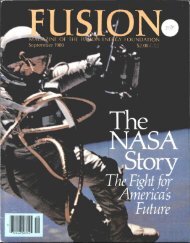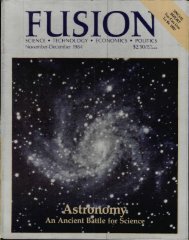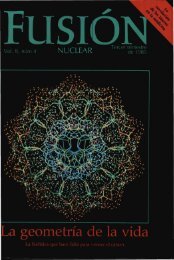and recreation. It was this idea derived largely from creativity and reason. The priesthoods acted ruthlesslythe Timaeus, and not from the eclectic variety of to destroy even the perception among the masses thatsources to which overstuffed Oxford and Cambridge reason and creativity exist, and where that failed, theyscholars attribute Philo's work that united all of sought to mystify the process and make it magicalPhilo's work. In the key volumes devoted to creation and fearful.in Philo, he sought to link the Timaeus with the Old The leading agent used to accomplish the goal ofTestament Genesis, the standard Jewish account of the the priesthood was Aristotle.world's beginning, in an attempt to harmonize the The god of Aristotle engineered as a constructtwo. Philo's pen gave new life, as we shall shortly see, in direct opposition to the Creator God of Plato'sto the account of Moses; for Philo implanted the Timaeus--was the parent god of the various cults andconcept of the Iogosas the driving force behind God's mystery religions that swallowed Rome in the periodcreation of the world, leading up to the first century. Relying on senseFrom the start, Philo's epistemology was designed perception rather than reason as the primary generativeforce behind knowledge,the pseudo-philosopherAristotle's view was that newknowledge could never becreated, but, instead, mancould only discover, categorize,and classify that whichexisted; for Aristotle, memorythe ability to hold inone's head all the mass of datacollected was the equivalentof intelligence! Aristotle's godreflected this notion, just asknowledge could not be created,or synthesized by themind, so the universe is notthe creation of God. For Aristotle,God is merely the "FirstCause," the objective ("outside")force that, eons ago, setthe universe into motion andthen stepped back, havingChrist Driving the Moneychangersfrom the Temple nothing more to do with theevolution of the cosmos? _to solve a problem of pedagogy that was first ad- In the Aristotelian view, God is forever distanceddressed in the Timaeus, four centuries earlier. In that from the universe and from mankind. Aristotle's god,work, Plato posed the following problem: in his the "unmoved mover," is self-contemplation, withdiscussion of the Creator God of Reason, Plato states the quintessence of remoteness, Aristotle's god existsrather bluntly that this concept is "very difficult to in eternity as a Mind engaged in contemplating itself:find, and, once it is discovered, impossible to explain thought "thinking itself." But this thought is a closedto everybody. ''23Philo rejected the idea that concepts circle. Aristotle has removed any hint of real creativeof such sublime majesty must remain the possession of energy.only a small elite; instead, he sought a method to Aristotle's god is self-absorbed, and does notcommunicate them to everyone. With that decision, ponder the fate of anyone or anything outside itself.in fact, humanist religion was born. For the god of Aristotle, communion with a humanOf course the ability of the population to grasp soul is unthinkable, impossible. In fact, Aristotle doesthe concept of reason was and is a learned skill, and not provide any clue concerning the relationshipthe difficulties are formidable. But the cult priesthoods between God the Absolute Being and the finiteand the oligarchy rdid not allow the normal peda- world. It is hardly an inspiring concept. In the aptgogical difficulties to stand alone. Ever since the time words of James Drummond, in his Philo Judaeus,of Plato and even before, the cults strenuously sought Aristotle's god is a "lonely and self-centered contosuppress and deliberately obscure the concept of sciousness toward which the world and man may34 August 1980 / CAMPAIGNER
wearily strive, but from which they may receive setting up anarchy in the well-ordered realm ofneither help nor sympathy. " 2s the world, leaving it without protector, arbitra-Aristotle's God was impotent, tor, or judge:For Aristotle, what was important was not God,but the world. What existed, and not how it came into As we shall shortly see, this polemic of Philo's wasexistence, was all that mattered, directed toward the task of destroying the prevailingPhilo, like Plato, did .not agree. In his central belief of the cult of Stoicism and its godfather,work, On the Creation of the World According to Moses, Aristotle.Philo launches a direct and bitter attack on Aristotle Philo believed passionately that the concept ofand his followers, the Peripatetics: progress could not be left abstract. In the decay of theRoman world, as Philo observed the descent into HellThere are some people who, having the world in that was occurring around him, he determined thatadmiration rather than the Maker of the world, for his followers--among the elite that Philo's workpronounce it to be without beginning and ever- created--the founding and construction of cities andlasting, while with impious falsehood postulate in new urban complexes would be the watchword forGod a vast inactivity; whereas we ought on the the humanist movement. Like Plato and Alexandercontrary to be astonished at His powers as Maker before him, the concept of creation applied mostand Father, and not to assign to the world a specifically to projects of city-building. In one of hisdisproportionate majesty. Moses, both because he most moving passages, in the Creation, Philo compareshad attained the very summit of philosophy and the creation of the Universe by God to the analogousbecause he had been instructed divinely in the design and construction of a "magnificent" city by agreater and more essential part of Nature's lore, "trained architect."could not fail to recognize that the universe must In its epistemological content, the passage repliconsistof two parts, one part active Cause and cates the thrust of the Timaeus, in which Plato develtheother passive object; and that the active Cause ops the concept of the perfect, intellectual modelis the perfectly pure and unsullied Mind of the ("pattern") or Idea which serves the creator in thenuniverse ... while the passive part is in itself bringing forth the sensual, ephemeral work of creaincapableof life and motion, but, when set into tion. Writes Philo:motion and shaped and quickened by Mind,changes into this most perfect masterpiece, [The architect] first sketches in his own mindnamely, this world. 26 well-nigh all the parts of the city that is to bewrought out: temples, gymnasia, town-halls,With remarkable poetic beauty, Philo here ridicules market places, harbors; docks, streets, walls to bethose who, like Aristotle, attribute a "vast inactivity" built, dwelling-houses as'well as public buildingsto God, and who admire "the world" rather than to be set up. Thus, after having received in his"the Maker of the world." But the polemical point, own soul, as it were in wax, the figures of thesewhich is elaborated in the rest of the piece, is his objects severally, he carries about the image of aemphasis on God's role as Creator. city which is the creation of his mind.In a passage that follows immediately, Philo goes Then by his innate power of memory, he reonto describe that, unless one asserts the existence of calls the images of the various parts of the city,divine Providence in guiding the daily evolution-- and imprints their types yet more distinctly in it:that is, unless one assumes the real and tangible and like a good craftsman be begins to build theexistence of Progress and the process of perfection-- city of stones and timber, keeping his eye uponthen there exists no justification for any system of the pattern and making the visible and tangibleethics:objects correspond in each case to the incorporealideas.Those who assert that this world is uncreated Just such must be our thoughts about God.unconsciously eliminate that which of all incen- We must suppose that, when he was minded torives to piety is the most beneficial and the mostfound the one great city, He conceived beforeindispensable,namely providence. For it stands to hand the models of its parts, and that out of thesereason that what has been brought into existencehe constituted and brought to completion a worldshould be cared for by its Father and Maker ....discernib!e only by the mind, and then, with thatBetween that which has never been brought into for a pattern, the world which our senses perbeingand one who is not its Maker no such tie isceive.formed. It is a worthless and baleful doctrine, As therefore the city, when previously shad-CAMPAIGNER / Aughst 1980 35
- Page 8 and 9: Behind theMiami Riotsby Felice Merr
- Page 11 and 12: 1. Policy-making: the Trila- their
- Page 13 and 14: _•_• •_• convention, was al
- Page 15 and 16: FEMA's vision of thefuture: a racia
- Page 17 and 18: Janet Reno completely bungled and f
- Page 19 and 20: IntroductionFor we wrestle not agai
- Page 21 and 22: esponding to his message, Philo ass
- Page 23 and 24: The enemy of the Christians was ind
- Page 25 and 26: ing of Rome itself, lasted hundreds
- Page 27 and 28: notions about the gods and views on
- Page 29 and 30: people who live in cities do not kn
- Page 31 and 32: prevailing bestiality would have to
- Page 33 and 34: Mediterranean elite, and in the pop
- Page 35: self-denial and a disassociation of
- Page 39 and 40: itself as many sensible classes of
- Page 41 and 42: altered or forged. The existence an
- Page 43 and 44: Certainly,Jesus entered Jewish soci
- Page 45 and 46: commitment to that ideal against we
- Page 47 and 48: Christ Presented to the People by P
- Page 49 and 50: cast into his garden, and it grew a
- Page 51 and 52: uilt the Christian movement was a b
- Page 53 and 54: pagan cults to bore inside the move
- Page 55 and 56: despite their inhuman behavior--whi
- Page 57 and 58: early gnostic text, Thunder, Perfec
- Page 59 and 60: And said, "O full of all subtlety a
- Page 61 and 62: • Rome• M A C ED O N IA "_i_::i
- Page 63 and 64: the level spaces. Then it climbed t
- Page 65 and 66: latter half of the second century,
- Page 67 and 68: great many people could be reformed
- Page 69 and 70: And upon her forehead was a name wr
- Page 71 and 72: 60 A.D. PAUL's Roman imprisonmenL a
- Page 73 and 74: The drugplagueis onlypartof tile st
- Page 75 and 76: severalanti-Falk letters, not just
- Page 77 and 78: BOOKSWhy the Green Nigger,Re-mythin
- Page 79 and 80: pathy, clairvoyanCe,*:;_'_%cogni- d
- Page 81 and 82: netarist school of economics beat a
- Page 83 and 84: illegal seizure of property rights)
- Page 85 and 86: of Cardinal Nicholas of Cusa as obl
- Page 87 and 88:
I.mERSiThis criticism of Carter is
- Page 89 and 90:
several years in England as the yea

















